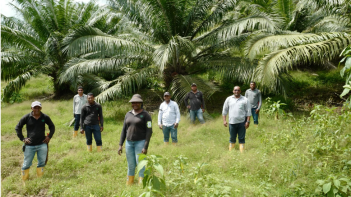On 15 December, members of the Sustainable Palm Oil Coalition for India (I-SPOC) convened virtually for the fourth time since its inception in September 2018. It was attended by 50 participants, including members and observers of the coalition.
Co-founded by RSPO, the World Wide Fund for Nature (WWF) India, the Centre for Responsible Business (CRB), and the Rainforest Alliance, I-SPOC is a multi-stakeholder national platform created with the goal of promoting sustainable consumption, import, and trade of palm oil and its derivatives along the supply chain. Besides the founding members, Hindustan Unilever, AAK India, and ‘The Sustainable Trade Initiative’ (IDH) are also a part of the organisation’s steering committee.
Through industry collaboration, the coalition aims to create broader awareness on sustainability issues within the industry and among consumers, and also facilitate multi-sector industrial dialogues on sustainable palm oil uptake. Besides that, they also want to build and grow sustainable trade partnerships through links with similar platforms, and encourage engagement in policy dialogues for a supportive environment and regulation.
Dheeraj Talreja, President of AAK India, said, “Working with I-SPOC members has been a great experience for us. It has been a remarkable journey and we have come a long way in creating awareness about sustainable palm oil. Certainly, a lot still needs to be done, but 26 organisations have joined the coalition so far, and there has been a huge progress. The next steps are to set Key Performance Indicators (KPIs) for ourselves and create criterias that will help us reach our goal of increasing the uptake of sustainable palm oil in India.”
The fourth meeting saw a significant rise in the number of observers, which is an indication that more businesses and non-governmental organisations (NGOs) are looking to join the coalition. Although the COVID-19 pandemic has created a new set of challenges and opportunities for the supply chain of palm oil in 2020, the conversation on deforestation-free commodities has also picked up significantly.
According to Sandeep Bhan, Chief Operating Officer of Sime Darby Oils, “The work done by the coalition is positive and we have many opportunities to engage further with different stakeholders. We need to have more awareness amongst importers, refiners, processors, and traders in India. This would include making them aware about the importance of sustainable palm oil because there is still a lack of clarity within this group right now.”
During the fourth I-SPOC meeting, the coalition launched a business guide for companies on “How to Transition to Sustainable Palm Oil (co-created by RSPO and I-SPOC), and a report titled ‘Sharing Responsibility and A Common Vision’ to highlight the work from 2018-2020. Both documents are available for download here.
Besides RSPO’s shared responsibility framework, I-SPOC can develop some metrics for its members to hold them accountable to transition to sustainable palm oil, for example, a requirement to have a sustainable sourcing policy and roadmap. There is an opportunity to use the ongoing training and capacity building work for sustainable palm oil production in India and farmers welfare programmes (income, yield, sustainable agriculture practices, etc.) to engage effectively with the government of India as well as the state governments, who are looking to create self-reliance for edible oils.
I-SPOC members will continue to focus on working with consumer goods manufacturers (CGMs) and retailers for market transformation efforts, and put more resources for better outreach and engagement. The coalition will also put more efforts in engaging banks and financial institutions to create a bigger demand factor.
The meeting saw the highest attendance since its inception, and members were very delighted to welcome new observers. The interest in sustainable palm oil has increased significantly in India. Organisations that are interested in joining or supporting I-SPOC can visit the I-SPOC website. For any other enquiries, please contact RSPO’s India Representative, Kamal Prakash Seth at [email protected].
Keep reading

Access into prisma

Updated Trace Function in prisma

Call for Expression of Interest: Independent Investigation of a Complaint

Latin American Smallholders, Key Global Brands Gather in Peruvian Amazon to Advance Sustainable Palm Oil

RSPO Forum for Members and Certification Bodies 2025: Strengthening Capacities and Building Bridges with RSPO Members

From Violence to Prosperity: Cultivating Sustainable Palm Oil in San Pablo, Colombia

Palmas de Tumaco: Enduring, Trusting, and Transforming in Colombia’s Pacific Coast
Carry Over Credits for Certified Independent Smallholder Groups




